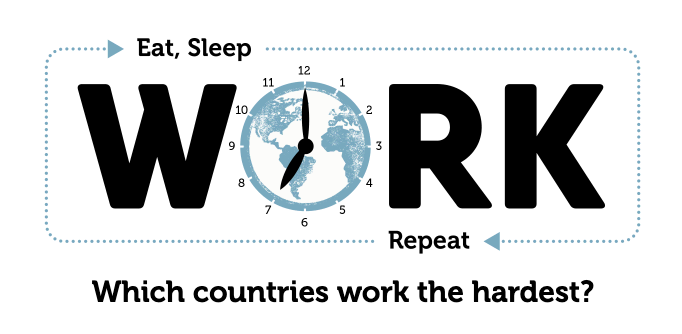The Hardest Working Countries: Who is working the most hours?

In today’s society, having a successful career is an important part of life and something that many of us strive for. Millennials especially view their jobs for more just than a means to earn money, but also something that will provide them with a feeling of happiness and fulfilment. According to one government survey, 77% of people said that choosing a career is the most important decision they would ever make. So, with jobs playing such a huge role in our modern lives, are we struggling to find a successful work-life balance?
Working hard is great, but overworking can be a serious health hazard, which is thankfully recognised by almost 80% of countries around the world that now have legislative provisions that apply some kind of maximum limit on weekly working hours, proving that workers rights have improved hugely over the years.
In the UK, Brits can’t work more than 48 hours a week (averaged over 17 weeks), unless they officially state that they want to. However, despite these regulations, there are some grey areas as many of us struggle to leave work at work, with 43% of office workers admitting to checking work emails at home and almost half staying at the office after hours. But how does the average working week here in the UK compared to the rest of the world?
RS Components have analysed International Labour Organisation data for almost 100 countries to see who is working the most and the least. You can see the graphic here.
The top countries with the lowest mean working weeks are:
-
Netherlands (32 hours)
-
Australia, New Zealand (33 hours)
-
Denmark, (34 hours)
-
Belarus, Canada, Ghana, Norway (35 hours)
-
Austria, Finland, France, Germany, Ireland, Israel, Mozambique, Sweden, United Kingdom (36 hours)
Somewhat unsurprisingly it’s predominating countries in Europe and Australasia that have the shortest working weeks, with the Netherlands enjoying the best work-life balance with a 32hr week. Already known for being a liberal country, the Netherlands, unlike many other countries, do not regularly work long hours of overtime.
Australia and New Zealand come in at a close second, both with average working weeks of 33hrs. The UK makes it into the top 10 with the 9th best working week, tied with countries like France, Germany, Ireland and Finland. Belarus. comes in at a joint fifth with countries like Canada, and Norway.
The top countries for longest mean working weeks are:
-
Nepal (54 hours)
-
Myanmar (51 hours)
-
Qatar (50 hours)
-
Bangladesh (49 hours)
-
Mongolia (48 hours)
It’s workers in Nepal that have the longest weeks, clocking up a staggering 54hrs on average per week, which is 22hrs more than those living in the Netherlands. Countries in Asia dominate the higher end of the graphic, making up seven of the top ten countries. According to the data, Israel and Kazakhstan are the best Asian countries for shorter working weeks, averaging 36hrs and 37hrs respectively.
The United States sits around the middle of the data, with Americans working around 39hrs a week on average, 1hr less than in the year 2000.
In total, 52% of the countries we looked at had average working weeks of 40 hrs plus which is 4 hours more than the average UK worker. The odd email check at home, extra hour at work and working through a lunch break all starts to add up. However, in comparison to countries like Nepal our working week looks quite doable.
Why maintaining a work-life balance is so important
Striking a work-life balance is not always easy, yet it really is important for the quality of your work and also your own personal health. In line with Mental Health Awareness week this week, it is important to acknowledge that businesses need to place more importance on mental health issues in the workplace.
Working too many hours can cause a common issue known as burnout. Which occurs when immense pressure is put onto a person, resulting in “chronic stress”. This can be caused from outrageous workloads and no work-life balance. Stress at work can also cause physical issues such as high blood pressure, which is simply not worth it.
It is also worth addressing that the quality of work is not a result of putting in the highest number of hours. Humans aren’t designed to be able to concentrate for long periods of time, so ensuring you take regular breaks is pivotal to being on your best form.
Why not take a look at how many hours your country works in average week and compare it to other people around the world. Take a look at the data here.











Responses